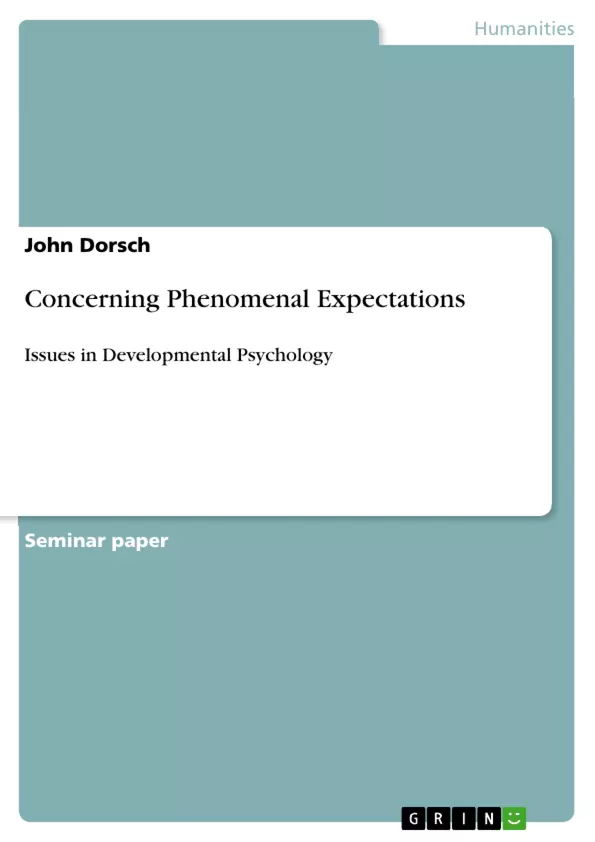Dishabituation experiments that involve an increase in the duration of longer looking times of infants have been argued to entail core knowledge. Despite how one chooses to understand the results of these experiments and whether or not core knowledge is needed to describe and explain them, what is needed is a theory that explains why infants find a state of affairs more novel and why infants behave as they do. This theory would account for infants' expectations. In his forthcoming publication, Stephen Butterfill suggest a theory based on what he calls phenomenal expectations. Butterfill maintains that phenomenal expectations not only describe and explain infants' behavior in anticipatory looking experiments, but also they are able to overcome Davidson's challenge of providing a middle-ground between propositional thought and mindless behavior. I begin by introducing the discussion concerning dishabituation experiments, core knowledge and phenomenal expectation, then I investigate the significance of phenomenal expectations integrated into theories of perception and test whether phenomenal expectations overcome Davidson's challenge.
Inhaltsverzeichnis (Table of Contents)
- Introduction
- Core Knowledge
- Object Indexes and Davidson's Challenge
- Phenomenal Expectations
Zielsetzung und Themenschwerpunkte (Objectives and Key Themes)
This text explores the concept of phenomenal expectations in relation to infant cognition and how it can provide a theory that explains infant behavior in dishabituation experiments. The text also investigates whether phenomenal expectations overcome Davidson's challenge, which argues against the possibility of understanding the infant mind.
- Dishabituation experiments and core knowledge
- Phenomenal expectations as a theory of infant cognition
- Davidson's challenge and the limitations of understanding infant minds
- The role of object indexes in infant perception
- The significance of phenomenal expectations in overcoming Davidson's challenge
Zusammenfassung der Kapitel (Chapter Summaries)
- Introduction: This chapter introduces the concept of dishabituation experiments and how they are used to investigate infant cognition. It discusses the importance of understanding infant minds and the role of core knowledge in their development.
- Core Knowledge: This chapter delves into the history of core knowledge claims, discussing theories like Piaget's enactivism and Gestalt theory. It highlights Spelke's experiments disproving these theories and introducing the Simple View as an alternative.
- Object Indexes and Davidson's Challenge: This chapter examines the theory of object indexes as a possible replacement for the Simple View. It discusses the limitations of object indexes in explaining dishabituation experiments and introduces Davidson's challenge, which questions the possibility of understanding infant minds.
Schlüsselwörter (Keywords)
The key terms and concepts explored in this text include dishabituation experiments, core knowledge, phenomenal expectations, Davidson's challenge, object indexes, infant cognition, and perception.
Frequently Asked Questions
What are 'phenomenal expectations' in infant cognition?
Phenomenal expectations, a theory suggested by Stephen Butterfill, aim to describe and explain why infants behave as they do in anticipatory looking experiments without requiring full propositional thought.
How do dishabituation experiments work?
These experiments involve measuring the looking times of infants; an increase in looking time suggests that the infant finds a state of affairs novel or unexpected.
What is Davidson's challenge?
Donald Davidson's challenge argues that there is no middle ground between propositional thought and mindless behavior, making it difficult to theoretically understand the infant mind.
What role do 'object indexes' play in this discussion?
Object indexes are examined as a possible way infants perceive objects, though the text explores their limitations in fully explaining dishabituation results.
Does the theory of phenomenal expectations overcome Davidson's challenge?
The text investigates whether this theory provides the necessary middle ground to explain infant perception and behavior where other theories fall short.
What other theories of infant development are mentioned?
The text references Piaget's enactivism, Gestalt theory, and Spelke's core knowledge claims.
- Quote paper
- John Dorsch (Author), 2016, Concerning Phenomenal Expectations, Munich, GRIN Verlag, https://www.grin.com/document/412269



